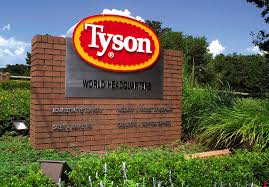Closures geared towards enhancing production capacity by discontinuing older and less efficient plants in various locations.
Tyson Foods, a major player in the food processing industry, has unveiled plans to close its Jacksonville plant, marking just one of eight closures set to occur across the United States as part of a comprehensive restructuring initiative before the end of 2024. This strategic move, detailed in Tyson’s latest fiscal year-end earnings report, is geared towards enhancing production capacity by discontinuing older and less efficient plants in various locations.
The CEO of Tyson Foods made the decision to close these underperforming plants as a means of optimizing the company’s overall operations. By focusing on more efficient facilities, Tyson aims to improve its competitiveness and meet the evolving demands of the food processing industry.
Tyson Foods formally filed a notice under the Worker Adjustment and Restraining Act on November 8, indicating that the Jacksonville plant will cease operations on January 8, 2024. This decision, while aimed at operational efficiency, unfortunately results in the loss of 219 jobs at the Jacksonville facility.
However, the restructuring effort is not confined to Jacksonville alone. Tyson Foods is also implementing similar closures at other locations, including Columbus, South Carolina; North Little Rock, Arkansas; Corydon, Indiana; Dexter, Missouri; and Noel, Missouri. This widespread approach underscores Tyson’s commitment to streamlining its operations and adapting to the changing dynamics of the food processing industry.
In terms of financial performance, Tyson Foods reported a 0.8% decrease in total sales to $52.9 billion for the year 2023. Furthermore, the company’s adjusted earnings saw a substantial 85% reduction, dropping to $1.34 per share. These figures reflect the challenges faced by Tyson Foods in an increasingly competitive market, necessitating the company’s strategic restructuring efforts to regain its foothold.
As Tyson Foods embarks on this transformational journey, it remains focused on maintaining its commitment to quality and safety standards while exploring innovative solutions to meet consumer demands. The company believes that by optimizing its production capacity and improving efficiency, it can continue to provide high-quality food products to consumers across the nation.
In conclusion, Tyson Foods’ decision to close its Jacksonville plant is part of a broader effort to enhance operational efficiency and adapt to market changes. While these closures are undoubtedly impactful, Tyson Foods is committed to evolving and delivering excellence in the food processing industry as it moves forward with its strategic restructuring plan.












